Some 7,000 North Koreans—most have defected though China—are currently living in South Korea. RFA's Korean service has interviewed hundreds of these defectors, many of whom ask to be identified by pseudonyms to protect relatives still living in the North. Following are excerpts of their in-depth interviews:
* * *
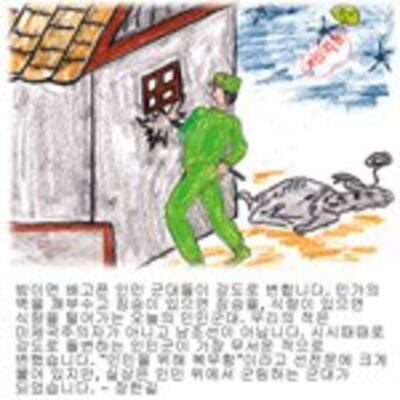
Jung Young defected from North Korea in 2002. He now works as a journalist in Seoul. The following are excerpts of his broadcast commentary on North Korean media:
“I read an editorial titled ‘The Victory of Socialism is a Principle of Historical Development’ in the Rodong newspaper dated Dec. 11. As I read the newspaper, I thought about how people in my hometown will suffer again this year to protect socialism, and I just felt very sad.”
“Numerous people will gather in the square and participate in a rally… and wave their fists while crying out slogans. They will then rummage through public restrooms and start on manure production. Even now, I have a vivid recollection of high school students going out to a state farm with handcarts full of manure, warming their hands with their breath.”
“Whenever the electricity is cut off, when you eat meals in the dark, you will rail at the United States for maintaining its embargo against North Korea. Then you will complain that the United States is sending barely enough relief goods for survival. I understand because I was in your situation not long ago.”
“I can also remember our mothers and grandmothers sighing and saying ‘Damn! We should have a war or something!’ after security guards confiscated goods they were selling on the street.”
“Pointing out the inequality in material life, the Rodong newspaper called capitalist society a reactionary society with impoverished cultural and moral life. I am sure they said this to prove the superiority of socialism over capitalism.”
“So is capitalist society really reactionary and poor? To help you understand, I would like to talk about our very basic need, eating. In South Korea, you no longer have to worry about where your meals are coming from. For example, the price of rice is about 1,000 won per kilo. There isn't much difference when you compare the price with that in North Korea. But if you work here for a day you can earn 50,000 won. This means even if you consume a kilo a day you can last for 50 days.”
“And it is not a rationing system. You work wherever you want to work and buy your own rice. No one asks you to show up at work to pick up your rations. And no one drags you to a training camp for not showing up either.”
“What about North Korea, though? People still die of hunger due to food shortages. When I listen to North Korean people in China these days, they say that even though they were told that they will receive their rations starting in October, they still don’t have enough to eat. If a socialist society really is a society for people, shouldn't it at least remove people's anxiety about daily meals? Last year, agricultural production was the ‘main frontline’ for North Korea's economic advancement, and it became this year's frontline as well. When the New Year begins, manure production will probably occur first.”
“I take the subway to work every morning. When I was in the North, I heard that there are a great number of unemployed people in the South and many homeless people can be found at train stations. So when I first came to the South, I went to different stations to look. Well, there’s actually a small number of homeless people but they don’t worry about what to eat. Public service organizations and churches provide free meals and help these people so that they can live on their own. South Korea has opportunities for everyone who works hard for themselves.”
“North Korea is propagandizing against the United States, saying it’s imposing economic blockade to isolate and crush socialism. In North Korea, the economic blockade refers to the United States freezing North Korean accounts at the Macau-based Banco Delta Asia (BDA) on Sept. 15. The United States wants to disclose the source of counterfeited US dollars that appears to have been produced in North Korea and hold it responsible. If any country forged and circulated your country's currency, you would be angry too.”
“But North Korea is insisting that it will participate in the six-party talks only if economic blockade is lifted, connecting the matter with the nuclear and counterfeiting issue. The United States of course is not about to unfreeze the bank account until the counterfeiting issue is resolved. If the blockade is not removed, the North Korean economy will suffer greatly. And it will be the people who suffer.”
"The New Year has begun. This year, the people will again be instigated to arm themselves with the revolutionary idea of military first and work for the final victory of socialism while demonstrating the spirit of their own strength. When I think that my friends, brothers, sisters, and parents will suffer as a result, I can't even swallow a small amount of food…"—Broadcast on Jan. 13, 2006
* * *
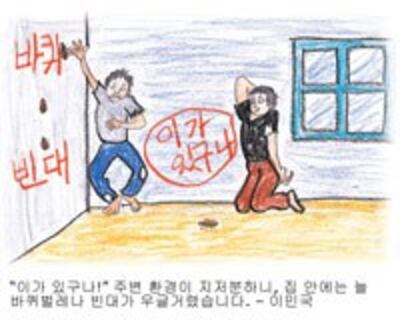
Lee Aeran defected to South Korea in 1997. Since completing a doctorate in food and nutrition at the Ewha Woman's University, she has worked as a manager for the General Association for North Korean Defectors in Seoul. The following are excerpts from her broadcast essay on words and phrases common in the South:
“The year 2005 is coming to an end. Everyone is quickening his steps to close the year on a good note. People are busy finishing plans that had been neglected during the year. During this month, people attend many gatherings or parties to meet with estranged relatives and friends and straighten out all their business relations. I think December is the month when people dine out the most. Already, many people who watch their weight are making plans to avoid gatherings with food. It’s different, but December also is a busy month for year-end gatherings in North Korea.”
“I am sure there are people who are watching for a chance to enjoy some rich food in this season. At this time of year, I feel sad because even though we are all Koreans by race, we live in very different circumstances. These days, department stores and large discount stores are bustling with shoppers enjoying winter ‘bargain sales’ at exceptionally low prices. In the South, these things are everyday, ordinary events.”
“Ah, you might not know what I mean by ‘bargain sale’ here. When I first came to Seoul, I also didn’t know what it meant. Everywhere I went, there was this sign and I was confused. Well, then, what is a ‘bargain sale’? On this term, a Korean language dictionary published in the South says that it is ‘the sale of certain products at a price lower than a fixed price, a discounted sale.’ In North Korean terms, it means sharply reducing the state authorized price and selling products as cut-price goods. In the North, stores that carry industrial products or department stores occasionally sell rejected or poor quality products. But you cannot get these items unless you have acquaintances or do back-door business.”
“Now, some might misunderstand and think that items that are sold in the South are either rejected or poor quality products but that is [NOT] the case at all. Needless to say, there is no need at all for acquaintances or a back door business. This is because products they sell are mostly brand name products imported from all over the world or in North Korean terms, extra fine articles.”
“You may wonder why they would have bargain sales in the first place. That is the question I myself had. Since goods are always in short supply, having sales like this is simply unimaginable in the North. In the South, everywhere you go, stores are full of merchandise. They have to produce new products for every season to follow the latest fashion trends. In one word, it is a sales war.”
"So when the seasons change, or when they put up new things for sale, they drastically cut the prices and inform customers about the sale or use different sale strategies to increase their sale volume. When you visit different places in Seoul, you will also find many discount stores. Such large discount stores are very popular among practical housewives. In the North, buyers are called visitors, but in the South they are called customers. In the North, a seller or a person in charge of selling is king because goods are scarce and extremely difficult to buy. But in the South, a buyer or a person who has buying power is king… They say, 'The customer…the visitor is king'. And in South Korea, the act of selling is called sales or marketing.'"—Broadcast on Dec. 1, 2005
* * *
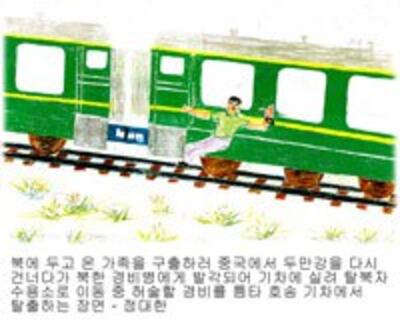
Kim Chunae fled North Korea in 2003 and now lives in Seoul. Following are excerpts from her broadcast commentary, “Life in Seoul, Life in Pyongyang”:
“Time slipped by without my noticing, and this is now my third New Year's Day in South Korea. Time really flows fast, like the Han River, and the past two New Year’s days—since I set my foot on this land—are already a distant memory. I guess I felt out of myself.
“But this New Year's Day became a lasting memory for me. On New Year’s Eve, after dinner, I left for the East coast with my son-in-law as I had promised my children… I went there to watch the very first sunrise of the year 2006, and reminisce about my past, and pray that my parents, brothers, sisters, and others still in my hometown in the North will soon be able to have a happy and comfortable life as I do.”
“At first, there was not a speck of cloud in the sky but soon it became cloudy, as if it had read my mind. We were sorry that we couldn't see the sunrise, but we couldn’t leave the beach. After a while we just headed to a restaurant for breakfast. My children said uncurdled bean curd is a delicacy in Kangwon Province, so we went into a specialty restaurant. When I said bean curd is not appropriate for New Year's Day, the children said since we can have meat and rice cakes every day, every day is a holiday, and there really is no difference between holiday food and everyday food. The children insisted that we taste a specialty in Kangwon Province, so we did—and it was delicious.”
“As I was looking at my children having uncurdled bean curd as a delicacy, I [remembered that]… in 1996, I couldn’t even prepare a bowl of rice for my children who had been anxiously waiting for this holiday. So after much thinking, I sold the cotton comforter that I had prepared for my daughter's marriage and bought two kilos of rice. The only thing I could do after that was make rice cakes with it. Alone I shed tears while I was making the cake. As I was thinking about this I had to smile bitterly and this made me think about the New Year's Day in my hometown.”
“After having dinner in Kangwon Province, we came back to Seoul and went to Taereung International Indoor Ice Skating Rink. When I was in school I was a well-known ice skater. The skating rink was crowded with people and was very noisy. I joined the crowd. But my aged body could not catch up with my young heart. When I said that I used to be an ice skater, my children laughed and made fun of me.”
“At first I was afraid and couldn’t even move, but when I saw other older women skating I became envious. So I took my jacket off and ran after them. Instantly my fear was gone and when I trusted myself it became really fun. Only then my children said, ‘You really ware an athlete’, and laughed. We enjoyed ourselves to our hearts' content and came home in the evening. And now I am sitting in front of a computer.”
"Now I am very happy. When I was in the North, people used to say that the happiest woman in the world is a woman who marries well, has children without any difficulties, and takes good care of her children. But now women who do not have to worry about what to eat or wear can also be included in this category of happy women. North Korean women cannot even think about taking care of their husbands or children because they have to worry about where their next meal is coming from."
"When I came to the South, the government gave me a nice apartment and they still deliver white rice every month at a low price. What's more, churches and organizations take care of all the problems I have. I can also have cold or hot water whenever I turn on the faucet. So I have no complains. All you have to do is work hard, and you can have all the things you want. There is no need to worry about what to eat or wear. So I just take good care of my children, and I can say that I am the happiest woman in the world…"—Broadcast Jan. 9, 2006
* * *
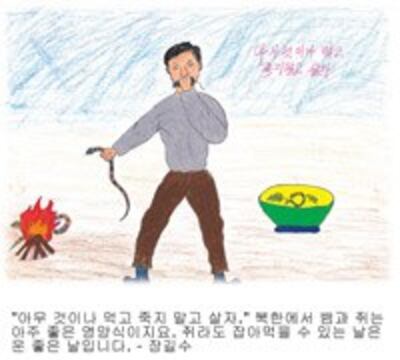
Pianist Kim Chul-woong, a graduate of the prestigious Pyongyang Dance and Music School, defected to South Korea in 2002:
“North Korea didn't allow any jazz type of music. I remember how touched I was when I first encountered jazz music. I am not saying that I came to South Korea to play jazz. I came to South Korea because I learned there are more genres of music than I knew, and I wanted to meet a whole new musical world...”
“Richard Clayderman is a jazz pianist in the U.S. His music was a big hit in the 1980s. His classical jazz focuses on melody, not on rhythm like other jazz pieces. Richard Clayderman expresses everything with only a piano, and that is what makes his music so beautiful. It is natural that humans’ emotions always look for beauty whether they themselves look good on the outside or not. His piano sounds even more beautiful because his music has that element….”
“It is important to find emotional fulfillment especially when you are angry or sad. Emotionally powerful music gives you peace of mind. The power of music is formidable.”
“My parents said I was clapping and dancing to music on the radio, so they thought I had musical talent. North Korea started an early music program when I entered Pyongyang Dance and Music School. The program started as part of the early program in the arts Kim Jong-Il ordered. I was eight years old …and it was 1981…”
“In South Korea there are admissions departments, but North Korea calls it an official department because the School incubates future North Korean officials. So the department’s 30-40 personnel go to all the art schools in the nation and select students based on their test results. If students pass the exam, they are given chances to come to the Pyongyang Dance and Music School to take the admissions exam. When I took the exam, there were 6,000 applicants and nine of them were admitted. I think I was very lucky…”
"[Later, at the Tchaikovsky Music School in Russia] I was 23 years old and I was living in the Embassy building. …Even when I wanted to drink vodka, I had to drink it in the Embassy building. I still like vodka although I do not drink it any more. I still remember that I used [to] put vodka in the snow and took it out and drank it. The best part about living in Russia was I could see a lot of beautiful women..."—Reported by Jinhee Lee and broadcast on Oct. 26, 2005.
* * *
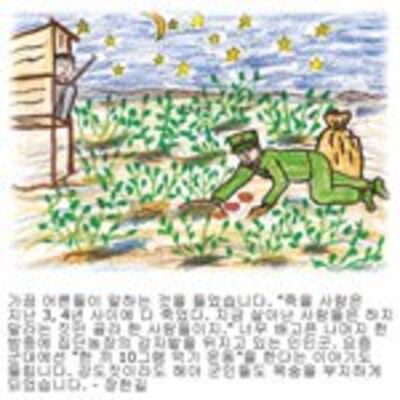
Jung Sung-san, grandson of North Korea’s minister of education, led a privileged life in his native country. But he was caught listening to a South Korean radio program in 1994 and was sent to the Sariwon prison camp. He later escaped to South Korea, where he currently works as a film director:
“I decided to direct a musical about No. 15, North Korea’s most notorious prison camp located in Yodok, South Hamgyung province. I decided to do the production because my father was publicly persecuted in the prison camp in 2002. I wanted to tell the story of my father, prison camps, and the human rights situation in North Korea. I originally decided to make a movie, but the cost would be too high, so I decided to make a musical…”
“I started my career as a stage producer in North Korea, and I majored in film production at Moscow National Film University and Pyongyang Theater University. I’ve directed a couple of plays in Dea-hak-ro [South Korea’s Broadway], so there was no technical difficulty in directing the musical. The only problem is the production cost. Since it involves such a high cost, it is hard to secure enough funding, which keeps me very busy…”
"If the performance is successful in South Korea, we would like to perform in Europe and the United States. I think it is very inhumane that the North Korean regime kills and abuses people for committing crimes that are not even considered crimes under normal circumstances. I desperately want to bring the musical to other countries, especially the United States, to awaken those people who ignore the human rights situation."—Reported by Jang Myeong Hwa and broadcast on Nov. 12, 2005.
* * *

Two North Korean couples spent years living in a cave on the southwest side of Maban Mountain, in China's Jilin province, a cave entrance-home, the entrance hidden by fallen leaves:
“We went to the mountain on March 19, [2000]... The ground was frozen so we could not dig very deep. As more North Korean people came to the town, more inspections took place. Other North Koreans were mostly single men, but I had a wife..."
"Due to the humidity in the cave, we built the stone flues on the floor for heating. When we didn't heat the floor, the moisture came up from the ground and trees. So we had to put many layers of paper on the floor…And we had to have some food stored for winter time. So we dried some vegetables and mushrooms. We took some of the dried food to the town. Then people gave us some kimchi out of pity. Kimchi was the food that I always craved. Sometimes, we dug up and ate the potatoes we planted, even though they were not ripe, because we had no other food."—Broadcast on July 13, 2005. Listen to the original story.
* * *
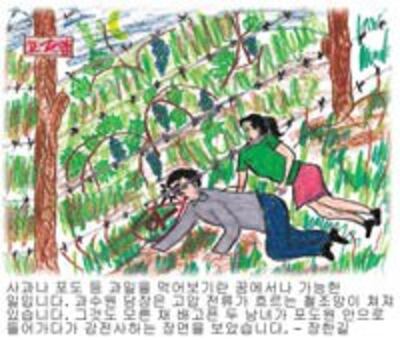
Yoo Sang-joon fled to China in 1998 with his older son, Chul-min, after his wife and younger son starved to death in North Korea. Later, he gave Chul-min into the care of an ethnic Korean Chinese family, who promised to see him at least graduate from junior high school and give him a chance of a better life than Yoo, with his illegal status in China, could manage. Chul-min died in a Mongolian desert of exhaustion during a lengthy journey he had hoped would lead him to Seoul:
"I talked with him on the phone [before he began the journey from China to South Korea]. He said only, 'I miss you, Daddy.' Then he said 'How are you, Daddy?', which was the last thing I heard from him. When it was time for us to be separated, my son continued to shed tears, but he didn't cry. It would have made me feel better if he cried hard though. I still remember him shedding tears, holding the cries to himself."
"We didn't have anything to eat from March to fall. We depended solely on grass or something to survive. Only Chul-min survived the famine. My wife and another son died because they didn't eat enough. ...We didn't starve in China, but we were scared of [being arrested by] the Chinese police...Ever since November 1998 Chinese police had arrested so many North Korean defectors."
"It was a challenge, to stay with my son, on the run. He had to live like a slave, hiding himself...I thought he would be better off being a Chinese, if not he would receive good education or become wealthy, and he wouldn't have to be hiding all the time.”
"I have nothing in my house. I don't have any luxurious items, nothing. What's the use of living well without my son? During the ceremony of cherishing my son's memory, I only prayed for him to be in a place where there is no famine, nor sorrow. I prayed for him to enjoy himself to the full, and hoped someone would keep his soul."—Broadcast on Sept. 9, 2004.
* * *
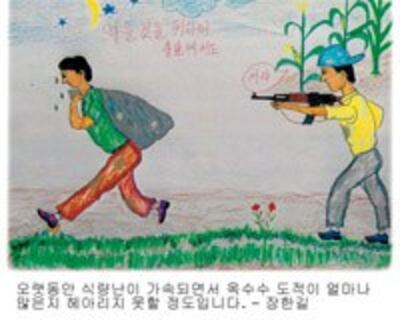
Choi Eun-sook was separated from her son in 1998 after she fled North Korea for a new life in the South—after which she managed to get news of Chol-rim by paying an ethnic Korean Chinese national to visit him. Her son initially refused to come and live with his mother in Seoul, saying he was ready to join the military to help re-unify the Korean Peninsula:
“That person went to Hyeryong, met my child, and they had a picture taken in front of the Kim Jongsook Memorial Hall. My child wore the clothes I sent... In the picture he is taller than me. ...My child grew up alone, by himself... I could not hold my tears. Then I made up my mind, that I will bring him out before he went into military service....His mind was already red. How well Kim Jong-il had educated him.”
Her son, Choi Chol-rim:
"A man's life is short, one life goes fast...It would be painful not to see her again, so I made up my mind to go with my mother...It is so much fun…When I am bored, I can play computer, I can read books, I can study. I eat food my mother prepares. I go to school...there are too many things to do. To be with my mother together...that is the happiest thing... It was my ultimate wish in North Korea that I could go to school, and eat meals prepared by my mother. Now that wish has been fulfilled, I am really happy."—Broadcast on May 11, 2004.
* * *
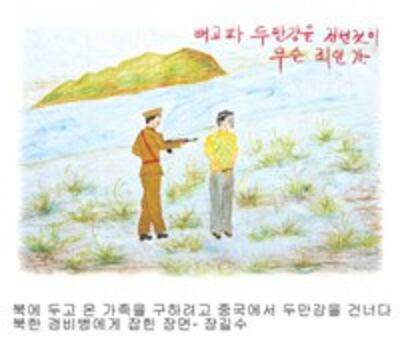
Han Yong-soo, who had defected from North by crossing the armistice line in 1995, later married Kwang-sook. Han’s father was a doctor and his mother graduated from Mankyung-dae Revolutionary School, which is reserved for children of the elites. Han Yong-soo said:
“We got married in 2000. It’s been already two years. We went to Saipan for our honeymoon, supported by an events-promotion company. …It was really nice. My wife told me to go there again if we have a chance. I like the ocean very much."
"I saw [my wife] once in a meeting (for North Korean defectors) before but we just introduced each other. I was working in Bang-Bae subway station in Seoul. One day, she happened to pass by the area where I was working. I was working in a ticket booth at the subway station and she was trying to buy a ticket. First I said to her that she looked familiar to me. And then she came to recognize me. So I asked her where her office is. She said her office was in Seocho-dong, which is right next to Bangbae-dong. So I suggested dinner sometime together. That’s how we started dating…”
“I didn’t [propose]. When we were dating, it seemed that my wife had already told [her family] about me. One day, when I took her home by my car after date late at night, my father-in-law invited me to come in to his house. He, then, asked me if I liked Kwang-sook. So I answered ‘Yes, I think I like her.’ And he went on asking if I was planning to ‘live together’ with her. I said ‘I think I will.’"
" Upon my answer, he said ‘All right, then, live together.’ So we got married… She's not the type of person who goes after luxurious goods or spends a lot of money. She doesn’t waste money. I can say she’s a frugal person. That’s what I like about her. You know, she’s older than me by two years. … “
“[We have a baby] girl. Her name is Han Ka-yeon. She will turn one year old in this coming January… I won’t let her grow in a miserable and unhappy circumstance like my wife and I had. I would just appreciate if she can grow up without any problems and become a person who can appreciate her life. As for education, I will support her up to where my wife and I had. I want my daughter to be a person who can express her own opinion freely in front of people…"
"[My hometown in North Korea] is a nice place to live. But the only thing is that it was in wrong time. I can say that something went terribly wrong, which made the country a dark and gloomy land. But I want to tell my daughter that it's a good place to live after all. Well, you should make a better world in that good place."—Reported by Jinseo Lee and broadcast on Dec. 18, 2002.
* * *
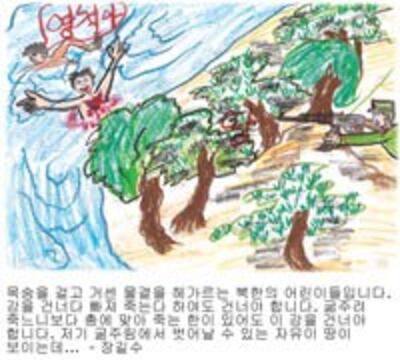
This North Korean defector visited Yanbian, China, and declined to be identified even by a pseudonym:
“Those who can cross the border like me or can do some kind of business can at least make a living. But those naïve people who work for a company or factory are having trouble. The government encourages them to have their own business but 40 to 50 percent of the North Korean population is not capable of doing such a thing and they just dedicate their lives to factories or farms."
"Many people are getting food from roots and selling wood after cutting them from a mountain. ...There are many people who take risks to cross borders. Since they have families and relatives in North Korea, they go back to North Korea to bring even a small portion of food and used clothes.”
“At the same time, those people are afraid of punishment or harm that will be inflicted on their families if they escape the country. However, people like me have a different reason from that. I realized that North Korea is a nation where corruption and complaints dominate the society, no freedom is given to the people, and democracy is not realized by any means."
"I would like to do something about that. I know that I am jumping into the fire, but I want to do something about this. It is not easy, but if I keep making efforts to this end, I believe the situation will improve some time…”
“After experiencing all kinds of different worlds and meeting South Koreans and foreigners, I realized that the world I knew was fake. Then, I realized that I am not the only one who should live in a different way, and I should help other North Koreans realize the reality too. Somebody has to do it."
" …North Korea’s leader says democracy is being realized in North Korea. The North Korean government says publicly that North Korea’s socialism is superior, human rights are respected, people are living comfortably and the government guarantees all these. They are deceiving the people, but people do not know what is going on. This really breaks my heart.
“When Kim Il Sung was alive, we all learned that everything exists for the people. The Juche ideology and all the government policies exist for the people. They put ‘people’ in everything, including hospitals, schools, the military, etc. such as ‘The People’s Hospital,’ ‘People’s School,’ ‘The People’s Military.’ But the reality is that the government was negligent of the peoples’ well-being, causing so many deaths for lack of food and so many wanderers all over the world. Isn’t that so heart-wrenching?”
“If the North Korean government values its people as they claim, they should start to implement appropriate policies as soon as possible. If it is hard, they should at least keep the door open for China, so that those who have relatives in China can get some food from their relatives in China. In North Korea, there is no freedom of thought, media, action, or even imagination. A democratic society should be able to fully guarantee human rights.”
“Wherever we go, we need to get a pass. In order to get a pass, a supervisor at work has to approve it first, and then a labor supervisor has to approve it again. And the request paper has to go to so many security agencies, defense agencies, and 20-30 more places. We have to get a pass even to go to somewhere close inside our own nation. Isn’t that an infringement of human rights? This social democracy is not even close to what democracy should be.”
"…[In a Chinese movie I saw], the main character, AQ, thinks he deserves what he gets. If he gets hit, he thinks he deserves it. If he is killed, he thinks he deserves it. And that is exactly how North Koreans are. North Koreans think they deserve what they get. They do not know how things are outside of North Korea. They do not know they have human rights that need to be upheld…"—Reported by Jinseo Lee and broadcast on March 16, 2004.
* * *
Lee Young-kook was a bodyguard of Chairman Kim Jong-il for 10 years. He defected to South Korea in 2002:
“Most North Korean bunkers are about 100 meters or 150 meters deep. North Korea started to build bunkers since 1958, by having borrowing technology from Switzerland and Sweden. Inside these bunkers, there are roads, and inside the roads, there are emergency passages everywhere… North Korean bunkers are very different from those in Iraq. Iraqis started to build them only 20 years ago, while North Korea did 50 years ago. You can still survive in the bunkers even with a blast of a nuclear bomb on the ground. You don’t even feel a vibration in there”
“The bunkers are big enough to accommodate restrooms, medical centers, restaurants, warehouses, medical supply rooms, including air-purifying system… Finding an entrance to the underground is very difficult, because the bunkers are about 150 meters deep and also are under subway stations. Nobody can penetrate into North Korean bunkers. So I can say if you throw a few chemical weapons into the hole, everything will be over just like that. There’s nothing like it.”
“Because of the case of Iraqi bunkers, bunker is probably quite a sensitive issue to North Korea. I think they would survive one year or two. They have invested a lot of money in building those facilities. The facilities themselves are good and equipped with the same machinery as the ground. The bunkers are Swedish style. They received support from Sweden in terms of engineers, and also they sent people to Sweden to learn its technology. South Korea borrowed the technology from the North in building underground caves.
“Emergency passages are made to lead to the underground bunkers. Passages are in every room of the summerhouse, leading you to the bunkers. They even made bunkers by burrowing into a mountain, which is probably 1,000 meters deep. The bunkers in downtown Pyongyang are usually from 100 meters to 150 meters in depth.”
“The Guard Command, guarding Kim Jong-il, consists of 100,000 soldiers armed with cutting-edge weapons including armored vehicles, warplanes, cannons, missiles, etc...."
"…When I think of it now since I'm here in the South, the North is a society beyond your imagination. If they detect somebody attempting a coup-d'etat in military authorities, he or she would be removed right away as long as Kim Jong il is alive…If the son succeeded Kim Jong il, the three generation in a row is going to come to rule the country, Usually, things start to fall apart from the second generation. Between 2 million and 3 million North Korean people have already died [of starvation]."—Reported by Jinseo Lee and broadcast on April 9, 2003.
* * *
Yoon, a woman in her 40s, defected to China in 2001:
“While I was in North Korea, I had to gather a lot of wild garlic in the mountain and sell them for one kilo of dried corn. I made porridge with the corn and ate little by little. I often had to skip lunch because the food was never enough. All the wild garlic that I cut in the mountain all day long is not worth more than 20 to 30 won and I could barely afford some dried corn with that. At least the food price was not this expensive before I left…”
“When all the family, including kids, go to a mountain and gather wild garlic, we could sell them for one kilo of dried corn. But since we could not work all the time, three of us ate about 200 grams per meal. If it rained we couldn't collect the vegetables, so we had to bear the hunger. And that is why we came to China. But even in China, the rice harvest was short last year, so we have to work really hard to make ends meet.”
"Because North Korean defectors are repatriated to North Korea all the time in China, we have to live in this deep mountain area, not in a town or city. As you see, this mud hut is open front and back. If the weather is warm, it is not too bad. But when the temperature goes down, even blankets do not help to keep us warm in the house."—Reported by Wonhee Lee and broadcast on June 16, 2004.
* * *
Lee Soon Ok spent six years at the Kae-Chon prison camp in North Korea, from 1986-92. She later escaped and published a memoir in 1996 titled "Eyes of the Tailless Animals," now translated into English, French, and German. She spoke to RFA about how to help the people of North Korea:
“Churches or civilian groups can bring people from the northern mountain area out of North Korea as long as it is not on a large scale. There is the People's Foreign Currency Earning Office under the Administrative and Economic Committee, and the central government does not take money from the Office. If Moosan [region in North Korea] people buy 100 tons of flour through the Office, that is for Moosan people. That is not something that the military can take for themselves...”
“A local Foreign Currency Earning Office trades its products for other products. They used to buy vegetable oil or laundry detergent before, but now, due to the food shortage, they buy food. And the military does not take this food..."
"The North Korean government does not arrest those who go outside of the country for food. Although they are defectors, as long as they bring food back to North Korea, those people are safe from military constraint. This means, we can collect all the funds in churches and send a few people to China to find people who can bring rice to North Korea. I think it is very effective at this point, since we cannot feed everyone."—Reported by Heajin Kim and broadcast on July 31, 2003
* * *
Kim Young Chul was arrested by Chinese police but escaped in 2002. He now lives in Seoul and works at the Durihana mission there:
“I was told that the Chinese police had already known what I was planning from three months before I got arrested. They got information about me from Chinese intelligence agents Agency as I was making a plan to go into the Ecuadorian Embassy… They tried to coax me into confession, saying they would not send me back to North Korea and even suggested we work together, if I provided them with documents relating to foreign press or other non-governmental organizations. But I refused to confess.”
“It became almost customary that the Chinese police pick people, who have been to Korean embassy or Consulate in China and interrogate them for two hours. Usually the police release them after it finds nothing wrong with them. But one of them during interrogation seemed to have talked too much, saying one person from North Korea is now in Beijing and is trying to go into the (Ecuadorian) Embassy."
"You know, they already knew everything about me. They finally showed me pictures of me and an audiotape where my voice was recorded, as I kept denying it...I was detained in jail for 16 days. They handcuffed me by a handrail. As I said I didn’t do anything, [but] they kicked me."
"You can say it’s one type of torture. And they try to force me to write a confession and put my thumbprint on it. I continuously refused to do that until the end. And they said they would hand me over to the North Korean Embassy in Beijing the next day morning and also said to me to give it a thought on that...”
“I said I want to go to a bathroom. They released me from the handcuffs for some reason without saying anything. You know I have prayed to God days and nights. I remember on that day I prayed even harder, wishing to grant me a blessing to let me free from that place. I could be killed in an open execution under such circumstances."
"You know what happened next? An investigator who was with me was trying to smoke a cigarette. He seemed like he didn’t bring a lighter so he went back to the other room to take the lighter. At that moment, I was able to take a chance. I jumped off the room that was on the 5th floor and succeeded in escaping from there."
"I just called [to the people who were planning to escape with me] and was able to get out of Beijing right away. I happened to get a car, so I drove all the way to Mongolia... We left China on November 29, a freezing cold winter night. The temperature was like 30-40°C below zero. We just prayed to God wishing to save us. We were desperate about finding a Mongolian military checkpoint. We saw dead bodies of North Korean people who died crossing the desert… A herd of wolves was trying to jump into the vehicle to catch us. We were so scared."
"I’m so thankful that we were able to make it. .... We ended up at a Mongolian military unit located in the border. I tried to speak in English, like ‘North Korea’ and also showed them a paper where I wrote that we are North Korean defectors in Russian.”
“And then they understood us and took us to the headquarters by car. They helped to contact with South Korean Embassy, saying that they had seven North Korean defectors and asking them to handle [us] in a humanitarian way. The Korean government requested them to hand us over to it. So we were able to go to the Korean Embassy in Mongolia from the military unit. Ten days after that, we were able to go to South Korea on Asiana Airlines.”
“We were altogether two males and five females, including a seven-year-old and a 12-year-old child. To protect the children from the freezing cold weather, I had to make them wear two winter coats each. And I had to cross over a barbed-wire fence three meters high and cross the desert at night with the children on my back. The weather was freezing cold so if you don’t move, you are going to die from cold. So we had to move all the time."
"Also since it was desert, there was no water available. Even though we took enough water with us when we left China, it ran out already when we arrived in the desert. We were so thirsty that we had no choice but to eat dirty and frozen snow. But we were able to reach the military base on the border… three days later."—Reported by Heajin Kim and broadcast on April 3, 2003.
* * *
